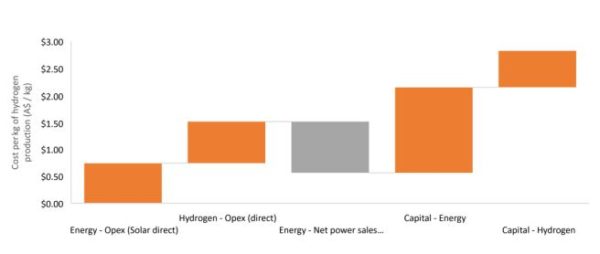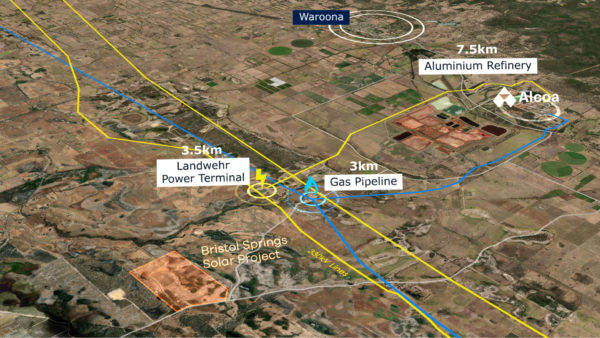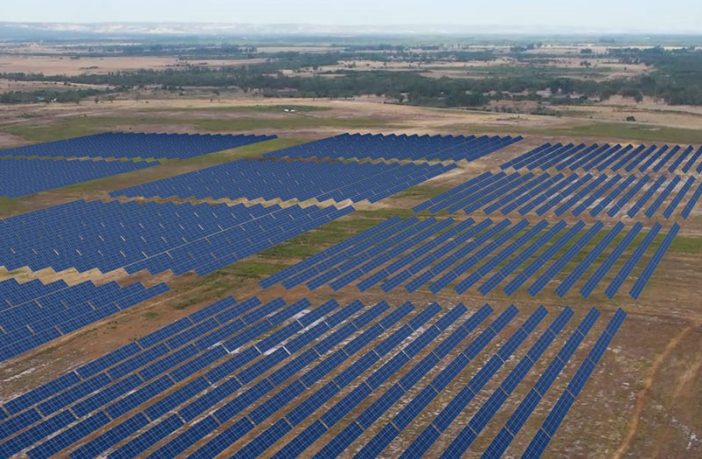- Frontier Energy said that results from a pre-feasibility study (PFS) into its proposed Bristol Springs Solar project in Western Australia show that it has the potential to be an early mover, low-cost green hydrogen producer.
The PFS, conducted by Perth-based Xodus Group, is based on the development of a large-scale green hydrogen production facility at Bristol Springs, with power sourced from the company’s planned first stage 114 MWdc solar farm. The solar would power a 36.6 MW alkaline electrolyzer, producing an estimated 4.4 million kilograms of green hydrogen per year.
Including the estimated capital outlay, the study forecasts a total unit cost of AUD 2.83 per kilogram of hydrogen produced which Frontier said “places the project as one of Australia’s lowest cost green hydrogen producers.” The projected cost of production also places the project within reach of the economic goal of producing green hydrogen for AUD 2 per kg, which would be cost-competitive with gas produced from fossil fuels.

Forecast costs per kilogram of hydrogen produced ($/kg)
Image credit: Frontier Energy
Frontier said the projected unit cost of $2.83 per kg is also far lower than the Australian Renewable Energy Agency’s (ARENA) current green hydrogen production cost forecast of between $6 to $9 per kg based on current electrolyser and renewable energy costs.
Frontier executive chair Grant Davey said the low cost is due in part to the project’s location near Waroona, about 120 kilometres south of Perth. To be built on a 195-hectare site next to the Worsley alumina refinery, the project is able to access existing infrastructure, including the Landwehr Terminal power line, allowing for excess solar energy to be sold via WA’s main energy grid. The company said there are also several established water sources in the area, meaning there is no requirement for capital-intensive infrastructure like desalination.
“Green hydrogen is a unique opportunity to store, move and distribute renewable energy and is set to play a huge role in helping humanity in decarbonising the energy we need,” Davey said.
“The Frontier Energy green hydrogen project is strategically located with suitable land, abundant water, South West Interconnected System (SWIS) access, gas pipeline access and transport infrastructure so as to be an Australian leader in ensuring that green hydrogen production and distribution becomes a near-term reality.”
The release of the initial PFS results comes just 48 hours after Frontier announced it had to secured exclusive options to acquire an additional 651 hectares adjacent to the existing BSS project site.

The project would seek to utilise existing infrastructure in the area.
Image credit: Frontier Energy
Davey said securing the land will allow the company to pursue its long-term ambitions to expand the size of the solar asset.
“By securing this ground we now have clear sight in increasing our energy production to approximately 500 MW of green energy that can be used to power our green hydrogen production as well as provide green energy onto the energy grid,” he said.
Frontier has previously said construction on the initial stage of the Bristol Springs Solar project is expected to commence in 2023 and it is close to finalising the expansion study that assesses the long-term growth potential of the project and outlines its long-term roadmap through the various stages of hydrogen production.
It also intends to soon commence front-end engineering and design for the hydrogen facility, which will include developing a phasing plan for the staged buildout to 150 MW electrolyser capacity.
Author: Dave Carrol
This article was originally published in pv magazine and is republished with permission.















